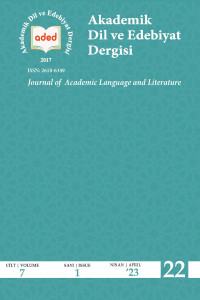Abstract
Ferit Edgü Türk edebiyatında küçürek öykünün başarılı örneklerini vermekle tanınmanın yanı sıra şiir, öykü, roman ve deneme gibi türlerde de yazmış bir yazardır. İlk baskısını 1999 yılında yaptığı ve üç bölümden oluşan “İşte Deniz, Maria” adlı öykü kitabının ilk öyküsü olan “Perisiz Ev”, yazarın 1985’te yazdığı ev ve sahibi arasındaki fantastik bir hesaplaşmaya dayanır. Sahipleri tarafından terk edilen eve seneler sonra evin oğlu gelir ve içinde biriktirdiği öfkeyi, çocukluğuna dair yaşadığı geçmiş anılarını eve hesap sorarak dile getirir. Öyküde ev sahibinin erkek olması dışında kendisine dair pek bir bilgiye verilmez. Anlatıcı pozisyonunda olan ev sahibi belleğinde yer edinen ilk aşkını, oyunlarını ve bahçedeki ağaçlarını ev sayesinde hatırlamaya çalışır çünkü mekanın bellek üzerindeki işlevi insandan ayrı düşünülemez. İnsanın neyi hatırladığı kadar neyi nerde, hangi mekanlarda hatırladığı da önemlidir. Geçmişin şimdi de anlatılmasında ise bellek kavramı önemli bir çalışma alanı sunmaktadır. Bu yüzden anlatıcı sadece eski evine dönmez hatırladıkları ve belleğinde sakladıklarıyla birlikte geçmişine de döner. Bellek aracılığıyla geçmişi anımsamak veya çağırmak belli nesneler, kokular, mekanlar ve bunun gibi birçok şey üzerinden gelişir. Bellek, insan hatırladıkça yeniden ve yeniden inşa edilen bir kavramdır. Anlatıcı belleğin girdaplarında dolaşmak için doğup büyüdüğü ve aslında hiç unutmadığı eve dönmek zorunda kalmıştır. Mekanlar, belleği canlandırır ve hiç beklemediği anda kendisinin dahi unuttuğunu sandığı hatıralarla yüz yüze getirir. Bu çalışmada bellekte depolanan hatıraların mekan ve içindeki nesnelerle olan ilişkisi başlıklar altında incelenmiş ve mekanın varlığının aynı zamanda hatıraların varlığına işaret ettiği görülmüştür.
Keywords
References
- Assmann, Jan (2022). Kültürel bellek eski yüksek kültürlerde yazı, hatırlama ve politik kimlik. (Ayşe, Tekin Çev.). Ayrıntı Yayınları.
Abstract
Ferit Edgü is a writer who is known for giving successful examples of short stories in Turkish literature, as well as writing in genres such as poetry, short stories, novels and essays. The Perisiz Ev, which is the first story of the short story İşte Deniz, Maria, which was first published in 1999 and consist of three parts, is based on a fantastic showdown between the house and its owner, written by the author in 1985. Years later, the son of the house comes to the house that was abandoned by its owners and expressess the anger he has accumulated inside, by asking the house to account for his past memories of his childhood. There is not much information about him in the story, except that the host is a man. The host, who is in the position of the narrator, tries to remember his first love, games and the trees in the garden, thanks to the house, because the function of the place on memory cannot be separeted from the human. What a person remember is as important as what he remembers where and in which places. The concept of memory offers an important field of study in telling the past in the present. Therefore, the narrator does not only return to his old home, but also returns to his past along with what he remembers and stores in his memory. Remembering or invoking teh past through memory develops through certain objects, smells, places, and many things like that. Memory is a concept that is rebuilt and rebuilt as people remember. The narrator has to return to the home where he was born and raised and never actually forgot, to wander through the whirlpools of memory. Places revive memory and bring them face to face with memories that they thought they had forgotten when they least expected them. In this study, the relationship of the memories stored in the memory with the space and the objects in it has been examined under the headings and it has been seen that the existence of the space also indicates the existence of memories.
Keywords
References
- Assmann, Jan (2022). Kültürel bellek eski yüksek kültürlerde yazı, hatırlama ve politik kimlik. (Ayşe, Tekin Çev.). Ayrıntı Yayınları.
Details
| Primary Language | Turkish |
|---|---|
| Subjects | Literary Studies |
| Journal Section | Articles |
| Authors | |
| Publication Date | April 30, 2023 |
| Submission Date | February 23, 2023 |
| Acceptance Date | April 23, 2023 |
| Published in Issue | Year 2023 Volume: 7 Issue: 1 |

